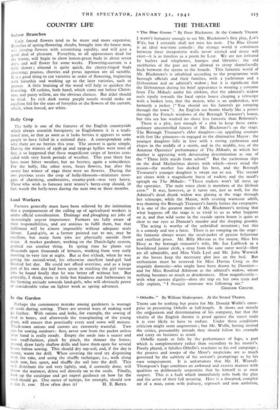THE THEATRE
"The Blue Goose." By Peter Blackmore. At the Comedy Theatre I WASN'T fortunate enough to see Mr. Blackmore's first play, Lot's Wife, but I certainly shall not miss his next. The Blue Goose is an ideal war-time comedy : the strange world it constructs between three inexpensive walls never existed and never will exist—it is as timeless as a poem by Lear. We are not irritated by butlers and telephones, lounges and libraries: the old snobberies of the past are not allowed to creep shamefacedly back between the syrens to the boards. This fantastic world of Mr. Blackmore's is inhabited according to the programme with borough officials and their families, with a yachtsman and a lifeboatman and an admiral's widow ; but it is significant that the lifeboatman during his brief appearance is wearing a costume from The Mikado under his oilskins, that the admiral's widow reels tipsily towards the local opera house clasping a telescope with a broken lens, that the mayor, who is an undertaker, was formerly a jockey (" You should see his funerals go romping through the town "). An English sea beams bluely like a poster through the French windows of the Borough Treasurer's house, but this sea has washed no shore less fantastic than Bohemia's.
There is a plot, just enough of a plot to keep these extra- ordinary uncontrolled fancies of Mr. Blackmore's on the stage. The Borough Treasurer's elder daughter—an appalling creature with feet like pinnaces—is engaged to the diminutive Mayor : the younger daughter falls in love with a roving yachtsman and elopes in the middle of a storm, and in the middle, too, of the Amateur Operatics' performance of The Mikado, in which her mother is appearing with devastating determination as one of the "Three little maids from school." But the yachtsman slips on the dead Michaelmas daisies with which—never mind the reason—the mother has decked his boat, and the Borough Treasurer's younger daughter is swept out to sea. The second act closes with a magnificent burst of rockets and the maid's epitaph on The Mikado: "Those rockets won't 'alf mess up the operatics. The male voice choir is members of the lifeboat crew." It was, however, as it turns out, just as well, for the Admiral's dead drunk widow was glaring at the stage through her telescope, while the Mayor, with evening waistcoat adrift, was shaming the Borough Treasurer's family before the ratepayers. It is one of the greatest merits of Mr. Blackmore's writing that what happens off the stage is as vivid to us as what happens on it, and that wild scene in the seaside opera house is quite as clear to our eyes as Duncan's murder and the sleeping grooms.
The acting is worthy of the unbridled invention ; but this is a comedy and not a farce. There is no romping on the stage: the fantastic always wears the strait-jacket of precise behaviour and excellent prose. Mr. Billy Merson as the mayor, Miss Iris Hoey as the borough treasurer's wife, Mr. Ian Lubbock as a bewildered junior clerk, a stray from the sane outer world—they are all admirable, and Miss Viola Lyel and Mr. John Warwick as the lovers keep the necessary plot just on the boil. But enthusiasm must be reserved for Miss Davina Craig as the ungainly domestic—who might have been drawn by Daumicr- and for Miss Rosalind Atkinson as the admiral's widow, whom nothing becomes so much as drunkenness. How magnificently— with what austere dignity—does she trip on her own train and icily explain, "I thought someone was following me."
GRAHAM GREENE.






























 Previous page
Previous page